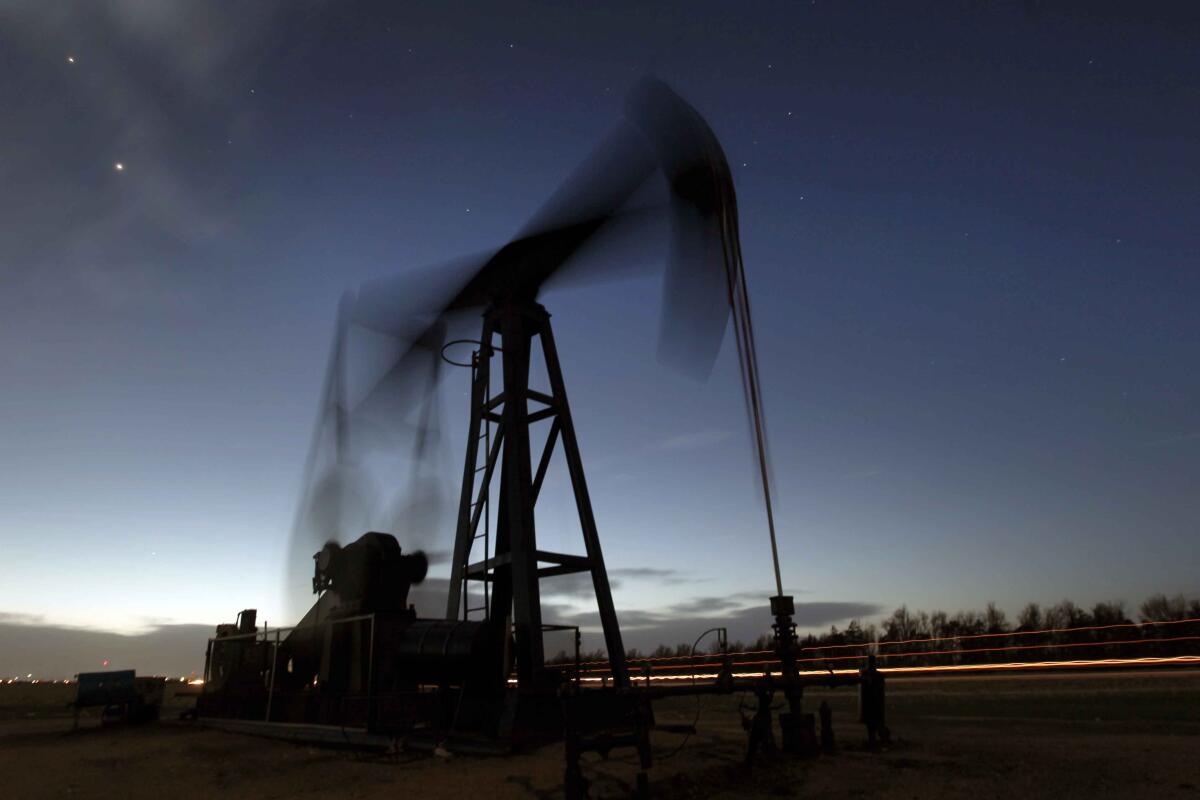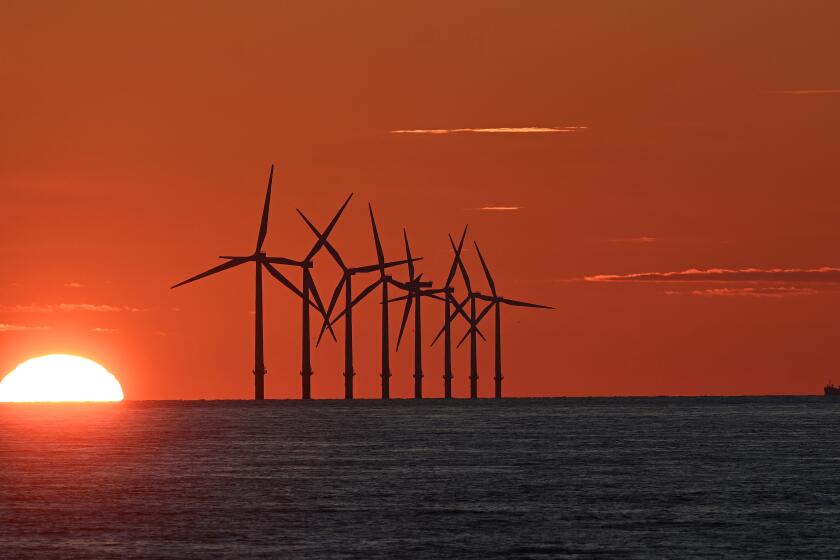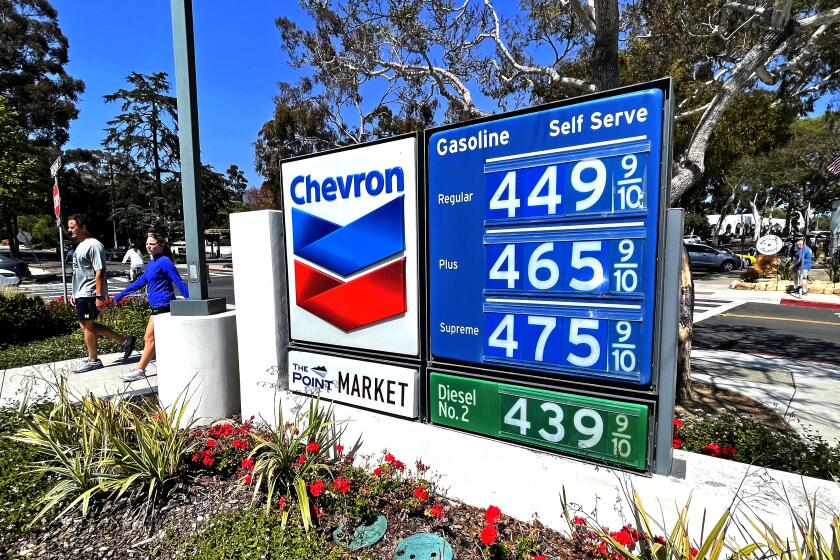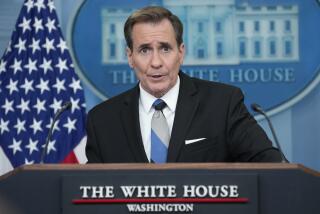U.S., other nations agree to release 60 million barrels of oil to ease prices amid Russian war

- Share via
All 31 member countries of the International Energy Agency have agreed to release 60 million barrels of oil from their strategic reserves — half of that from the United States — “to send a strong message to oil markets” that there will be “no shortfall in supplies” after Russia invaded Ukraine, the group said Tuesday.
The board of the Paris-based IEA made the decision at an extraordinary meeting of energy ministers chaired by U.S. Energy Secretary Jennifer Granholm. She said in a statement that President Biden approved a commitment of 30 million barrels and that the U.S. is ready to “take additional measures” if needed.
The group’s “decision reflects our common commitment to address significant market and supply disruptions related to President Putin’s war on Ukraine,” Granholm said.
Russia plays an outsized role in global energy markets as the third-largest oil producer. Its exports of 5 million barrels of crude per day amount to about 12% of the global oil trade. Some 60% goes to Europe and another 20% to China.
So far, U.S. and European sanctions have not barred oil or gas exports and have included exceptions for transactions to pay for oil and gas. Western leaders are reluctant to restrict Russian oil exports at a time when global energy markets are tight and high prices are fueling inflation in developed economies.
But the invasion has still shaken markets worldwide. On Tuesday, oil prices soared, with U.S. benchmark crude surpassing $100 per barrel — the highest price since 2014.
Gov. Newsom calls on state pension funds CalPERS and CalSTRS, as well as the UC Retirement System, to divest Russian assets over the war in Ukraine.
“The situation in energy markets is very serious and demands our full attention,” IEA Executive Director Fatih Birol said. “Global energy security is under threat, putting the world economy at risk during a fragile stage of the recovery.”
Besides the United States, other members of the organization include Germany, France, Britain, Japan and Canada. IEA members hold emergency stockpiles of 1.5 billion barrels of oil. The release amounts to 4% of stockpiles, or roughly 2 million barrels per day for 30 days.
It’s only the fourth time in history that the IEA has done a coordinated drawdown since the reserves were established in the wake of the Arab oil embargo in 1974.
From the U.S. perspective, the price of crude oil determines a big portion of what drivers pay to fill up their cars with gasoline.
The national average for a gallon of regular gas is $3.619, which is 24 cents more than a month ago and 90 cents more than a year ago, according to motor club federation AAA.
In California, the average set another daily record at $4.837 a gallon, up 10 cents in the last week and $1.15 in the last year. California drivers are paying more at the pump than those in other states.
Doubling down on oil and gas isn’t the answer, some security experts say.
In November, Biden announced a release of 50 million barrels of oil in coordination with other energy-importing countries, but the measure had only a fleeting impact on oil prices, which have continued to rise. Soaring fuel costs become a growing political problem for President Biden.
Granholm stressed the need to invest in renewable energy as a way to reduce dependence on Russian oil and natural gas.
Russia’s aggression has spooked a market already tightened by a vigorous recovery in demand as the pandemic eases, and constraints on supply owing to underinvestment and disruptions around the world. Trading giants Vitol Group and Trafigura Ltd. expect triple-digit prices to continue for a prolonged period.
The IEA’s intervention comes after the OPEC+ coalition, which is led by Saudi Arabia and Russia, disregarded encouragement from Biden last year to increase supplies more quickly. The group meets again on Wednesday to discuss its production plans for April.
Riyadh has signaled that it doesn’t consider markets to be tight enough to speed up the restoration of production that the Organization of the Petroleum Exporting Countries and its partners halted during the pandemic. Many other nations in the 23-member alliance couldn’t increase supplies any faster even if they chose to, owing to lack of investment and instability.
Will gas and food prices continue to rise? How might the conflict in Eastern Europe affect Silicon Valley and Hollywood?
Previous coordinated oil deployments by IEA countries came during the 1991 Gulf War, and the onslaught of Hurricanes Rita and Katrina in 2005.
Bloomberg reporting was added to this Associated Press report.
More to Read
Inside the business of entertainment
The Wide Shot brings you news, analysis and insights on everything from streaming wars to production — and what it all means for the future.
You may occasionally receive promotional content from the Los Angeles Times.













